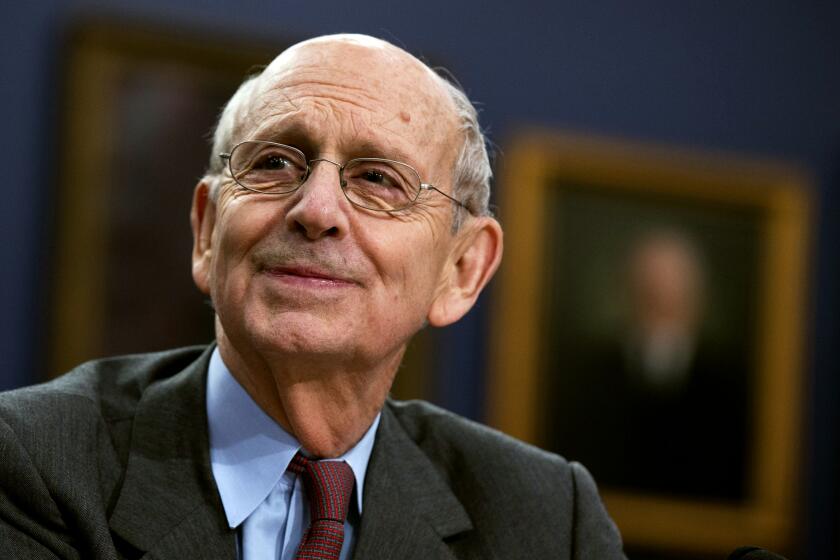Editorial: On Biden’s promise to appoint the first Black woman to the Supreme Court: It’s about time

President Biden had an opportunity last week to wriggle out of his campaign promise to appoint a Black woman to the U.S. Supreme Court. Standing alongside Justice Stephen G. Breyer, who announced his plan to retire at the end of the current court session in June, Biden said he would “select a nominee worthy of Justice Breyer’s legacy of excellence and decency,” and he could have simply added that the pool of potential justices would include Black women. He’d have taken some heat for watering down his pledge, but it would probably pass.
Instead, the president doubled down. Good.
“The person I will nominate will be somebody with extraordinary qualifications, character, experience and integrity,” Biden said. “And that person will be the first Black woman ever nominated to the United States Supreme Court.”
Breyer’s reported plan to retire, and President Biden’s appointment of a successor, is unlikely to reduce the partisanship that has beset the court.
Biden is correct that such an appointment is, in his words, “long overdue.” The Supreme Court is the ultimate arbiter of the meaning of the Constitution, federal law and numerous state laws that affect the lives and liberty of more than 300 million people, yet only two Black justices have ever served on the court. The nation’s population is slightly more than half female, but the nine-member court has never had more than three women justices at a time. A court that is stacked with justices who have the background and perspective of only a narrow slice of the American people cannot expect to forever retain the confidence of the nation it serves.
The simple fact is that more people voted for Biden in 2020 than any other presidential candidate in U.S. history, and they did so knowing that he had already followed through on his pledge to select a Black woman as his running mate by picking Sen. Kamala Harris. Voters have every right to expect him to adhere to his Supreme Court promise.
The promise itself is important, as is the follow-through, because both underscore the fact that there is now a strong “bench” of eminently qualified Black female jurists, attorneys and legal scholars who would be a credit to the Supreme Court. Though their names have been mostly unknown to the general public, they are well known and respected in legal circles. News reports most often cite Court of Appeals Judge Ketanji Brown Jackson, California Supreme Court Justice Leondra Kruger and civil rights lawyer Sherrilyn Ifill, but there are many others as well.
That wasn’t always the case. To have a qualified pool of potential justices, there must first be a pool of experienced attorneys and scholars, and before that, sufficiently large pools of law school graduates and college graduates with access to great educations that will allow them to achieve success in their professional and intellectual lives. Until the 1970s, women and people of color were excluded from the top echelons of the legal profession by racial and gender discrimination and economic factors. We continue to live with the consequences. Now the growing classes of more diverse graduates, lawyers and judges is coming of age at the highest levels of leadership.
Fixed terms would lower the political temperature of Supreme Court appointments
Still, that bench of qualified women, Black people and others has been insufficiently tapped. It often requires a leader from the ranks of the privileged and powerful — a Joe Biden, for example — to change the way we select top officials and to point out that the narrowness of vision of the past has acted against our national interest.
By recognizing that potential nominees of the highest “qualifications, character, experience and integrity” include an untapped pool of people, Biden helps to correct that national shortcoming and brings us closer to keeping the promise of justice for all.
More to Read
A cure for the common opinion
Get thought-provoking perspectives with our weekly newsletter.
You may occasionally receive promotional content from the Los Angeles Times.











